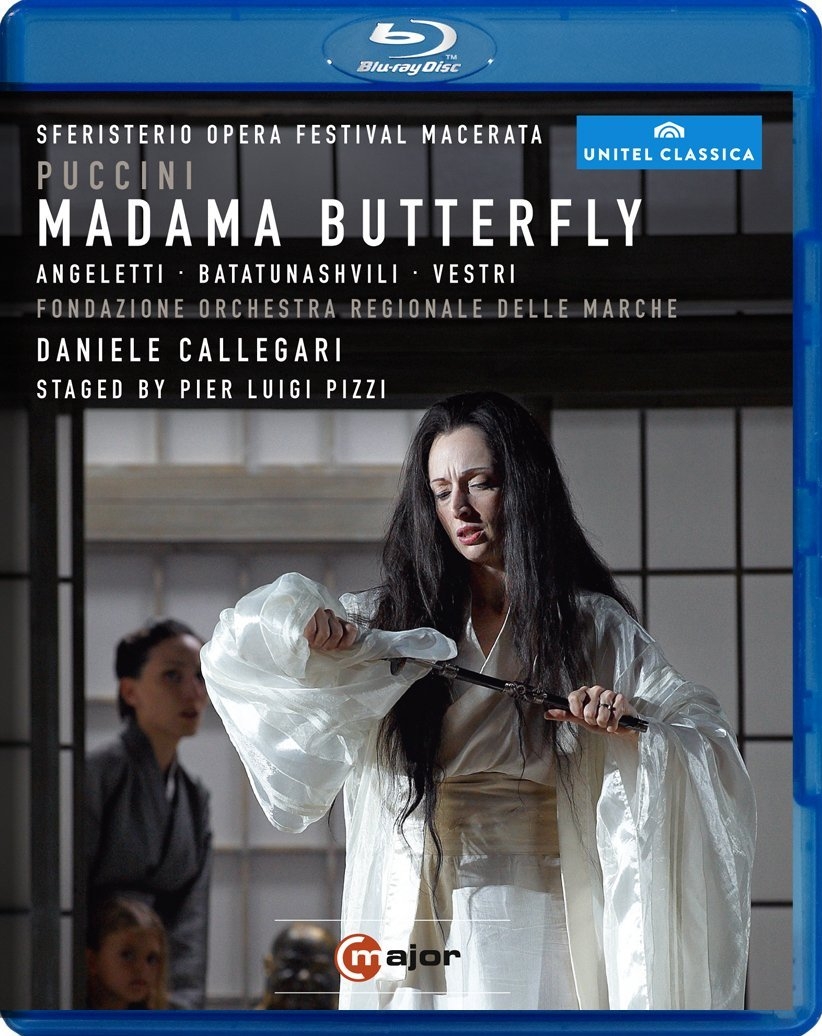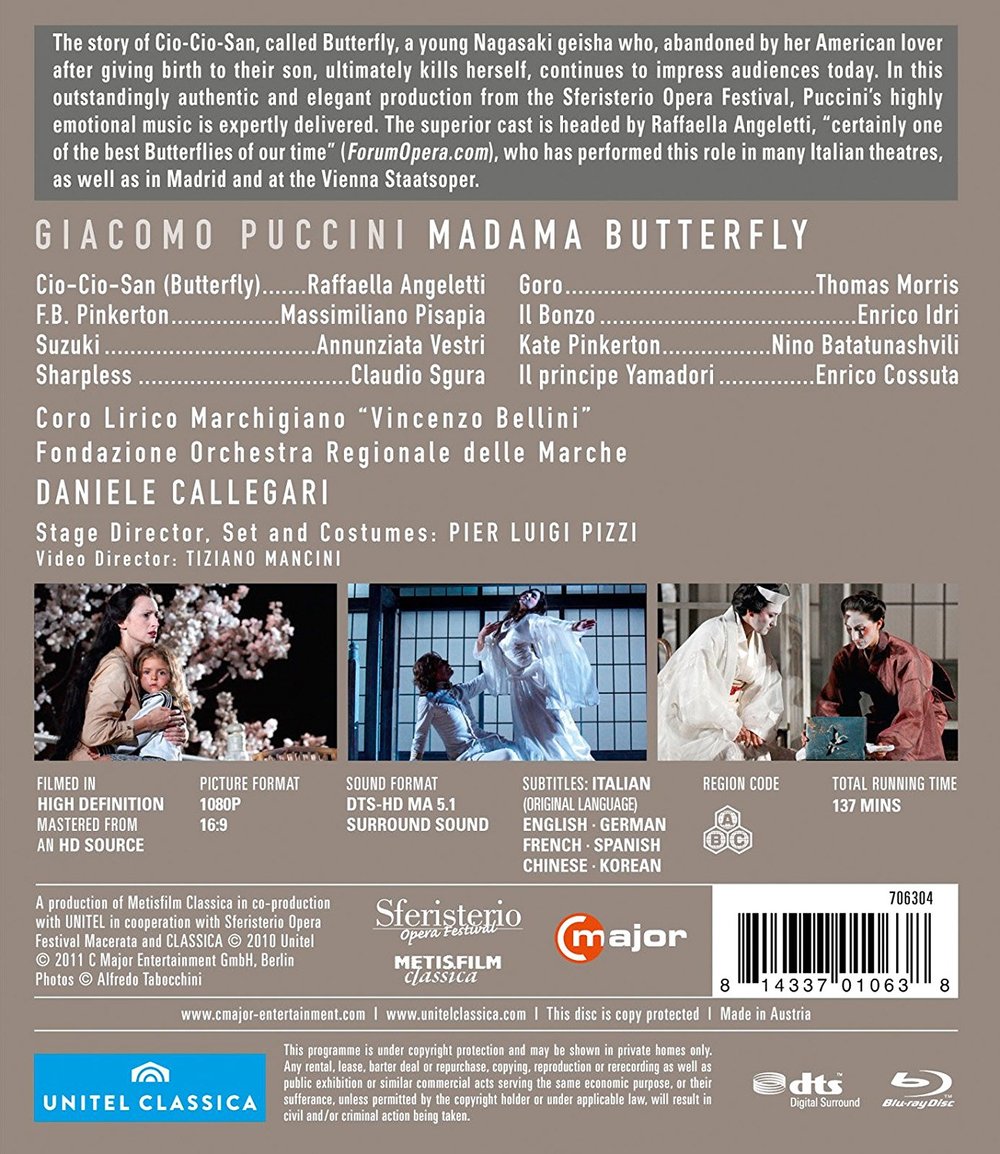

Puccini Madama Butterfly opera to libretto by Giuseppe Giacosa and Luigi Illica. Directed 2009 by Pier Luigi Pizzi at the Sferisterio venue as part of the Macerata Opera Festival. Stars Raffaella Angeletti (Cio-Cio-San or Butterfly), Annunziata Vestri (Suzuki), Massimiliano Pisapia (B. F. Pinkerton), Claudio Sgura (Sharpless), Thomas Morris (Goro), Enrico Cossutta (Prince Yamadori), Enrico Iori (Il Bonzo), Nino Batatunashvili (Kate Pinkerton), Antonio Maria Golini (Uncle Yakusidé). Matteo Ferrara (The Imperial Commissioner), Alessandro Pucci (The Regitrar), Mirela Cisman (Butterfly's Mother), Roberta Carota (Butterfly's Aunt), and Maria Elena Mariangeli (Butterfly's Cousin). Daniele Callegari conducts the Fondazione Orchestra Regionale Delle Marche and the Coro Lirico Marchigiano "Vincenzo Bellini" (Chorus Master David Crescenzi). Set and costume design by Pier Luigi Pizzi; lighting by Sergio Rossi; choreography by Roberto Maria Pizzuto. Directed for TV by Tiziano Mancini. Sung in Italian. Released 2011, disc has 5.1 dts-HD Master Audio sound. Grade: B
One of the joys of opera in HDVD is a chance to see brilliant pictures of the venues. The Arena Sferisterio is located in Macerata, a city and province in the Marche region of Italy; and it is featured in a summer event called Festival Macerata. The imposing Arena was built in 1829 in a simplified and dignified classical style. It seats 3000 + and is dominated by a long, high masonry wall across the rear because it was originally built to be the site of extravagant hand ball competitions!
Outdoor stages present all kinds of problem to opera directors. High-definition recordings often turn out badly in arenas because the sets, costumes, and props designed to be seen from afar look ridiculous up close (see the hideous Tosca HDVD shot at Arena di Verona for proof of this).
But director Pizzi was able to use his arena brilliantly for this one-set Madama Butterfly. The image of the cool Japanese cottage and gardens nestled in the warm embrace of the stone Sferisterio is remarkably beautiful. And all design elements are to normal scale and were probably intended to look good in video.
On the left is B. F. Pinkerton (Massimiliano Pisapia) a U.S. navel officer who is about to enter into a marriage-at-will contract with Miss Butterfly arranged by a broker in the Japanese port of Nagasaki. Pinkerton is impressed by the beauty of his bride, but he still views her as a concubine. His friend is the U.S. Consul Sharpless (Claudio Sgura) who believes that Butterfly is in love with Pinkerton:
Cho-Cho-San or Miss Butterfly (Raffaella Angeletti) arrives at the love nest with her family and friends:
She tells Sharpless she's old enough to marry:
Now we see how Pizzi takes advantage of the wide outdoor stage to develop an elegant set:
Sharpless warns Pinkerton again not to hurt Miss Butterfly:
Cho-Cho-San is now Mrs. Benjamin Franklin Pinkerton, or Madama Butterfly. Also, she has "converted" to Christianity at the Mission:
The conversion brings condemnation on her from the Bonzo (Enrico Iori), her uncle and an elder of her clan:
According to Conrad Wilson in his book Giacomo Puccini (Phaidon 20th-Century Composers series 2008), Madama Butterfly's wedding night ends Act 1 with the longest and best-developed love duet Puccini ever wrote:
Act 2. Pinkerton was sent to a new post. He gave Madama money and pre-paid the rent for 3 years. But Madama hasn't been heard from him since:
Butterfly still believes Pinkerton will return. Suzuki the maid (Annunziata Vestri) is more realistic:
Butterfly sings the famous aria "Un bel dì, verdemo":
Sharpless learns that Pinkerton is returning to Nagasaki. But he will not see Madama Butterfly because he now has an American wife. Sharpless doesn't have the heart to tell this to Madama, but he urges her to marry Prince Yamadori:
Now Madama Butterfly has a surprise for Sharpless. Pinkerton has a son that neither Pinkerton nor Sharpless knew about:
Pinkerton arrives at the love nest with his wife and Sharpless. They intend to ask Butterfly to let them take the boy to America. Pinkerton is honest at least this time:
Madama Butterfly sees Sharpless and the American woman. She figures it out:
Japan is a one-race country, and a mixed-race child there faces daunting discrimination, especially if poor. Butterfly had hoped that Pinkerton would take the boy and her to a better life, but now this hope is gone. They just want the boy:
Pinkerton's wife, Kate (Nino Batatunashvili), is a sympathetic woman who's in a trap herself. She had no idea she was landing in Nagasaki to become a step-mom:
Butterfly tells Kate and Sharpless to go down the hill and find Pinkerton. If he comes back in 30 minutes, he can have the child. They don't realize they will receive the child from Suzuki. Butterfly has her father's sword. Butterfly strikes the first blow and Suzuki provides the coup de grâce:
I especially liked the set, the costumes, Pizzi's superb stage directions, the acting he got out of his singers, and the video work of Tiziano Mancini.
This is a regional production with the Fondazione Orchestra Regionale Delle Marche, not a household name. So one should not expect here the kind of elite orchestra playing one gets, say, from the Wiener Philharmoniker. But every opera orchestra in Italy knows Madama Butterfly by heart, and the performance with Callegari was adequate although the sound recording of the orchestra was weak. I could hear the singers well because, I think, each was equipped with a body mike.
Cio-Cio-San is supposed to be 15 when we meet her. Raffaella Angeletti can't hide the fact that she is more than three times older than that. I was able to get screenshots of her that are reasonably flattering, but there are other times when her features come across rather harshly in my HT. She manages to impress me anyway with decent singing and even better acting. (I hope she later did something about those yellow teeth!) The other singers provided strong support and the chorus hummed well.
If this were just any opera, I might give this disc a C+. But I'll cite Conrad Wilson again who says Madama Butterfly is Puccini's greatest opera. And did anyone write a stronger tear-jerker than this? So in honor of all those tears, I'll move the grade up from C+ to B.
OR




















